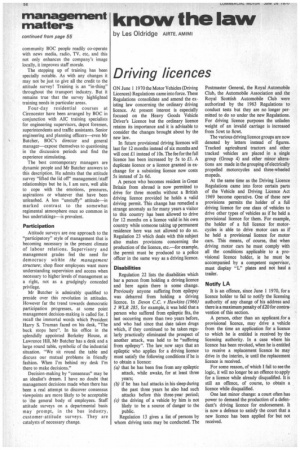Driving licences
Page 58

If you've noticed an error in this article please click here to report it so we can fix it.
ON June 1 1970 the Motor Vehicles (Driving Licences) Regulations came into force. These Regulations consolidate and amend the existing law concerning the ordinary driving licence. At present interest is especially focused on the Heavy Goods Vehicle Driver's Licence but the ordinary licence retains its importance and it is advisable to consider the changes brought about by the new law.
In future provisional driving licences will last for 12 months instead of six months and will cost El instead of 10s. The fee for the full licence has been increased by 5s to .£1. A duplicate licence or a licence granted in exchange for a subsisting licence now costs 5s instead of 2s 6d.
A person who becomes resident in Great Britain from abroad is now permitted to drive for three months without a British driving licence provided he holds a valid driving permit. This change has remedied a strange anomaly as for many years a visitor to this country has been allowed to drive for 12 months on a licence valid in his own country while someone taking up permanent residence here was not allowed to do so. Regulation 23 which deals with this subject also makes provisions concerning the production of the licence, etc.—for example, the permit must be produced to a police officer in the same way as a driving licence.
Disabilities Regulation 22 lists the disabilities which bar a person from holding a driving licence and here again there is some change. Previously anyone suffering from epilepsy was debarred from holding a driving licence. In Devon C. C. v Hawkins (1960 2 WLS 285, for example, it was held that a person who suffered from epileptic fits, the last occurring more than two years before, and who had since that date taken drugs which, if they continued to be taken regularly practically eliminated the prospect of another attack, was held to be "suffering from epilepsy". The law. now says that an epileptic who applies for a driving licence must satisfy the following conditions if he is to obtain a licence:
(a) that he has been free from any epileptic attack, while awake, for at least three years; (b) if he has had attacks in his sleep during the past three years he also had such attacks before this three-year period; (c) the driving of a vehicle by him is not likely to be a source of danger to the public.
Regulation 13 gives a list of persons by whom driving tests may be conducted. The Postmaster General, the Royal Automobile Club, the Automobile Association and the Royal Scottish Automobile Club were authorized by the 1963 Regulations to conduct tests but they are no longer permitted to do so under the new Regulations. For driving licence purposes the unladen weight of an invalid carriage is increased from 5cwt to 8cwt.
The various driving licence groups are now denoted by letters instead of figures. Tracked agricultural tractors and other tracked vehicles are placed in a single group (Group 4) and other minor alterations are made in the grouping of electrically propelled motorcycles and three-wheeled mopeds.
At the same time as the Driving Licence Regulations came into force certain parts of the Vehicle and Driving Licence Act 1969 become operative. One of these new provisions permits the holder of a full driving licence for one class of vehicles to drive other types of vehicles as if he held a provisional licence for them. For example, the holder of a full licence for motorcycles is able to drive motor cars as if he held a provisional licence for motor cars. This means, of course, that when driving motor cars he must comply with all the conditions applicable to a provisional licence holder, ie he must be accompanied by a competent supervisor, must display "L" plates and not haul a trailer.
Notify LA It is an offence, since June 1 1970, for a licence holder to fail to notify the licensing authority of any change of his address and there is a maximum penalty of i20 for contravention of this section.
A person, other than an applicant.for a provisional licence, may drive a vehicle from the time an application for a licence to which he is entitled is received by the licensing authority. In a case where his licence has been revoked, when he is entitled to receive a replacement licence he may drive in the interim, ie until the replacement licence is received.
For some reason, of which I fail to seethe logic, it will no longer be an offence to apply for a licence while already disqualified. It is still an offence, of course, to obtain a licence while disqualified.
One last minor change: a court often has power to demand the production of a defendant's driving licence for endorsement. It is now a defence to satisfy the court that a new licence has been applied for but not received.






















































































































